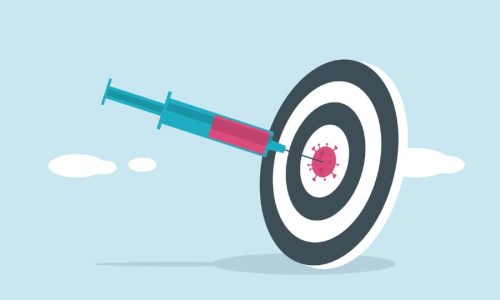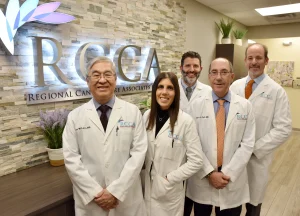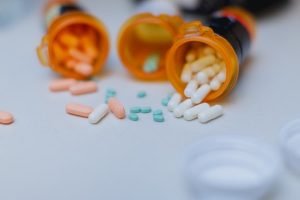
PSMA Therapy for Metastatic Prostate Cancer
A targeted, infused therapy that delivers radiation directly to cancerous cells has been shown to extend survival in many patients with metastatic prostate cancer. The
HIPAA Alert: Potential Data Breach Learn More
Questions on Oncology, Hematology and/or Infusion Clinical Services due to COVID-19 Crisis – CALL 833-698-1623
Important Information for Our Patients Regarding the Coronavirus.
RCCA Providing Area Cancer Patients with Access to Care During Coronavirus Outbreak
RCCA Offering Patients Virtual Visits During Coronavirus Pandemic
The National Cancer Institute defines targeted therapy as “a type of cancer treatment that targets proteins that control how cancer cells grow, divide, and spread.” The approach is called “targeted” to distinguish it from treatments, such as chemotherapy, that have a broader impact. For example, many forms of chemotherapy act against cells that divide and form new cells more rapidly than normal. This makes chemotherapy effective against cancerous cells, because they increase in number faster than most normal cells, but it also contributes to chemotherapy’s side effects, such as the hair loss that occurs when chemotherapy affects hair follicles, which also multiply faster than most other cells in the body.

By contrast, targeted therapy acts against proteins – typically on the surface of cancer cells – that facilitate the spread of cancer. The advantage of this approach is that targeted therapies do not have a direct impact on healthy cells. A limitation of the approach, however, is that not all patients’ cancers are marked by the genetic mutations that cause those proteins to be present on or in cancer cells. Therefore, oncologists must test a patient’s tumor to see if it has a “targetable” mutation. This testing is performed when a sample of the tumor is obtained via a biopsy or after the tumor has been removed in a surgical procedure. (In some forms of cancer, such as chronic myelogenous leukemia, a target mutation is present so frequently that physicians sometimes do not test for the mutation before starting therapy with a targeted agent.) Scientists are working hard to identify new target mutations and proteins and to develop new therapies that act against those targets. As a result, the list of targeted therapies has expanded dramatically in recent years and further advances are expected in the years just ahead.
Regional Cancer Care Associates (RCCA) provides state-of-the-art treatments, including targeted therapy, for patients with cancer and blood disorders in New Jersey, Connecticut, Maryland, and the Washington, D.C., area. In this article, RCCA discusses targeted cancer therapy and how it is used to treat both solid tumors and cancers of the blood and blood-forming tissues.
Some types of cancer that may be treated with targeted therapy include:
Targeted cancer therapy is sometimes referred to as precision medicine because the drugs administered target changes specific to each patient. Even two people with the same type of cancer may have different targets and thus receive different targeted drugs.
The United States Food and Drug Administration (FDA) has approved a variety of targeted drugs for cancer treatment, but they do not all work in the same way. Targeted cancer therapy drugs can be used to:
Targeted therapy can be effective on its own, but it is most successful when used in combination with other treatment methods such as chemotherapy, radiation, surgery, and immunotherapy. Which targeted drug a patient receives and how often he or she receives it will depend on their type and stage of cancer, their overall health, and other conditions. In many cases, targeted therapies are used after a patient’s cancer has progressed following prior types of treatment, but there has been a trend in recent years to prescribe targeted therapy earlier in the course of a person’s treatment.
There are two main types of targeted therapy drugs: small-molecule drugs and large-molecule drugs. Small-molecule drugs are small enough to go inside cancer cells and block a specific substance inside them, while large-molecule drugs are too big to fit inside cells. They work to attack targets on the surface of cells. Some subtypes of targeted drugs include:
Targeted therapy mainly leaves healthy cells alone while directly acting on cancer cells, so it usually results in fewer side effects than treatments such as chemotherapy that may affect healthy cells too. However, some patients receiving targeted therapy will experience side effects, while others will experience none. This is because everyone reacts to treatment differently. Further, the incidence and intensity of side effects tends to vary based on the type of targeted therapy and its dosage. Possible side effects of targeted therapy include:
Rarely, some targeted drugs can cause damage to the heart, especially when used in conjunction with certain chemotherapy medicines. Another rare side effect is a serious autoimmune reaction that can cause serious or even life-threatening problems in the organs. These side effects are rare, but patients should always discuss the risks and benefits of every treatment with their doctors.
Minor side effects from targeted therapy often resolve on their own or with simple treatments. Doctors may be able to prescribe medications to offset side effects such as nausea and diarrhea. Patients should contact their medical team with any questions about side effects and ways to mitigate them.
How are targeted therapy drugs administered?
Some targeted therapies are given intravenously. Others come in oral form are swallowed—either as a pill, capsule, or liquid.
Is targeted therapy always effective?
Targeted therapy is effective for many types of cancer, but it does not work for all cancer types or patients. A patient must have a tumor with specific genetic changes that are susceptible to the targeted therapy. Even in those patients, however, some tumors do not respond to targeted drugs and may only partially respond to the medications.
Can patients become resistant to targeted therapy?
Yes. Some patients can become resistant to targeted therapy drugs over time, with their cancer cells becoming unaffected by the drug. If that happens, doctors often try using different targeted therapy drugs together or with another type of treatment for maximum efficacy.
How do patients know if targeted therapy is working?
When patients receive targeted therapy, they have regular testing to evaluate how the treatment is affecting the cancer. These assessments can include blood tests, imaging scans, and other tests.
Learning that you have cancer and then having to decide on a treatment approach can be overwhelming. The medical oncologists, hematologists, and nurses of RCCA know that facing cancer is hard—which is why RCCA is dedicated to providing world-class care to patients close to home. As one of the largest networks of cancer care physicians in the U.S., RCCA provides trusted treatment options to patients throughout New Jersey, Connecticut, Maryland, and the Washington, D.C., area.
Patients choose RCCA for their cancer care because of our:
These are just some of the reasons why patients come to RCCA for their targeted therapy or other cancer treatment. Read through RCCA’s frequently asked questions to learn more.
The experienced medical oncologists and hematologists of RCCA carefully consider each patient’s situation to identify the best treatment approach for him or her, making use of immunotherapy, targeted therapy, chemotherapy, hormonal therapy and other treatments – alone or in combination – in highly individualized treatment plans. To learn more about targeted cancer therapy at RCCA, request an appointment today at one of our locations in New Jersey, Connecticut, Maryland, and the Washington, D.C., area.
For more information or to schedule an appointment,
call 844-346-7222. You can also schedule an appointment by calling the RCCA location nearest you.

A targeted, infused therapy that delivers radiation directly to cancerous cells has been shown to extend survival in many patients with metastatic prostate cancer. The

Patients receiving treatment from Regional Cancer Care Associates in Moorestown are in good hands. Five of its physicians — Dr. Seth Berk, Dr. Maurice Cairoli, Dr.

The world of cancer treatment is rapidly evolving. New therapies are being discovered, and existing ones have improved, resulting in better patient outcomes. Regional Cancer

Regional Cancer Care Associates is one of fewer than 200 medical practices in the country selected to participate in the Oncology Care Model (OCM); a recent Medicare initiative aimed at improving care coordination and access to and quality of care for Medicare beneficiaries undergoing chemotherapy treatment.